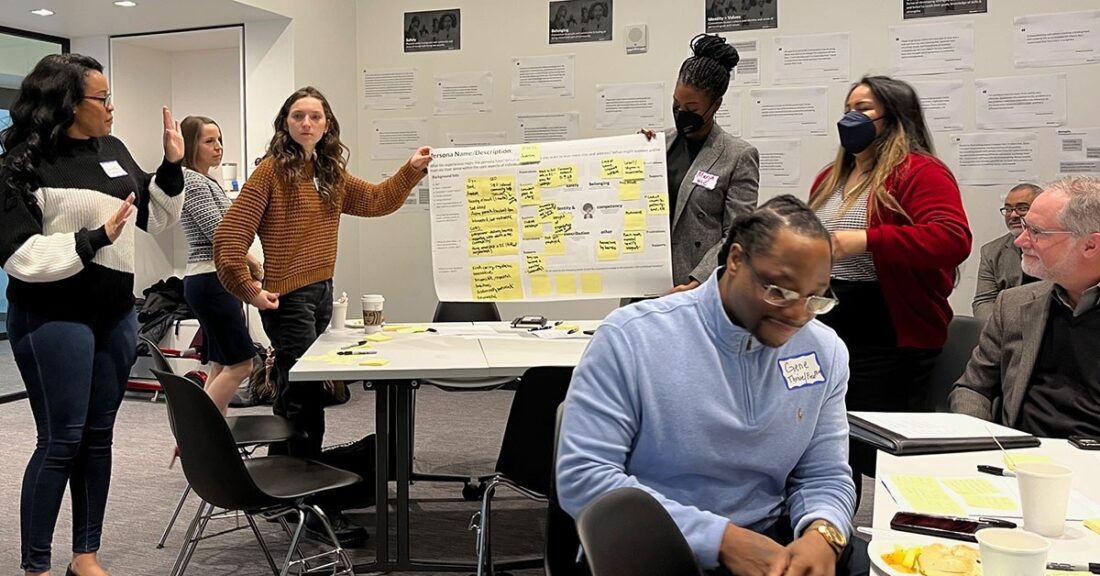Three Jurisdictions to Test Justice Framework for Young Adults

Participants in the Washington, D.C. Emerging Adult Justice Series hosted by the Thrive Under 25 Coalition, with support from the Justice Policy Institute, Feb. 2023.
The Annie E. Casey Foundation has awarded grants to three jurisdictions to test and help refine a developmental framework — or set of principles — focused specifically on achieving positive outcomes for people ages 18 to 25 involved in the criminal justice system. For the next two and a half years, government agencies and community-based organizations in Massachusetts, Nebraska and Washington, D.C., will work with young adults to determine how best to apply the principles to policies and practices that help this group of people thrive.
As part of the solicitation and selection process, Casey partnered with the Emerging Adult Justice Project at Columbia University’s Justice Lab. The Project will provide technical assistance to all three sites testing the developmental framework.
“This experimentation will put these jurisdictions at the forefront of a burgeoning field, targeting an age group that has long been overrepresented and underserved by the criminal justice system,” says Felipe Franco, a senior fellow at the Foundation.
Meet the Awardees
Massachusetts: Legal Defense
The Committee for Public Counsel Services (CPCS), the statewide public defender agency, will lead a test of the developmental framework in the context of indigent defense representation of emerging adults. The juvenile and adult divisions of CPCS will work together and with other organizations to advocate for emerging adults’ well-being and social, psychological and other needs. Community partners include UTEC, a youth organization with expertise in supporting the wellness, development and leadership skills of emerging adults involved in the justice system. The initiative begins with pilots in Lowell and Lawrence with plans to expand statewide.
Nebraska: Probation and Reentry Policies and Practices
The Nebraska Administrative Office of the Courts and Probation (AOCP) will apply the framework to reshape the agency’s practices for young adults ages 18 to 25 who are on community supervision. Beginning in two communities — one rural and one urban — AOCP will train a group of probation officers to specialize in work with emerging adults, including conducting individualized and strengths-based case planning and partnering with community-based organizations to support positive learning, growth and development. AOCP will collaborate with emerging adults and organizations such as the RISE prisoner reentry program and the National Center for State Courts.
Washington, D.C.: Continuum of Care
Justice Policy Institute and other members of the D.C. Emerging Adult Justice Action Collaborative will use the framework to provide more developmentally appropriate responses to emerging adults who are prosecuted for criminal offenses, as set forth in the District’s Youth Rehabilitation Amendment Act of 2018. This includes creating a community-based continuum of care for emerging adults with justice-system involvement, covering basic needs such as affordable housing and health services and providing dedicated support for this age group through specialized court programs, probation policies, physical facilities and reentry support services. Throughout the implementation process, emerging adults with current or previous justice involvement will advise JPI and its partners — the Thrive Under 25 Coalition and Free Minds Book Club & Writing Workshop, among others.
“We are excited to be working across professions and roles in three very different places,” says Lael E.H. Chester, director of the Emerging Adult Justice Project. “Our goal is not to provide a one-size-fits-all solution for emerging adult justice but to explore how different systems can adapt to put young people on a path to success.”
Why Focus on Young Adults
Nationally, people ages 18 to 25 are overrepresented throughout the criminal legal system, have the highest recidivism rates and experience the most extreme racial and ethnic disparities, particularly in correctional facilities. Too often, the justice system fails to recognize the developmental needs of this population and treats emerging adults in almost the same manner as older, fully mature adults.
The Foundation is dedicating at least half of its investments over the next decade to improving the well-being and prospects of youth and young adults so that they can thrive by age 25. The Foundation’s Thrive by 25® commitment recognizes that the road to adulthood can be a challenging one for many, but youth and emerging adults in the criminal justice system, young people of color in low-income families, youth in high-poverty communities, young parents and youth making the transition from foster care to adulthood face significant obstacles that can stall their aspirations and prospects or derail them entirely. These young people are therefore the Foundation’s focus — and more importantly, partners — for its Thrive by 25 efforts to invest in programs and advance policies to help them change the trajectory of their lives and prevent lifelong problems.






